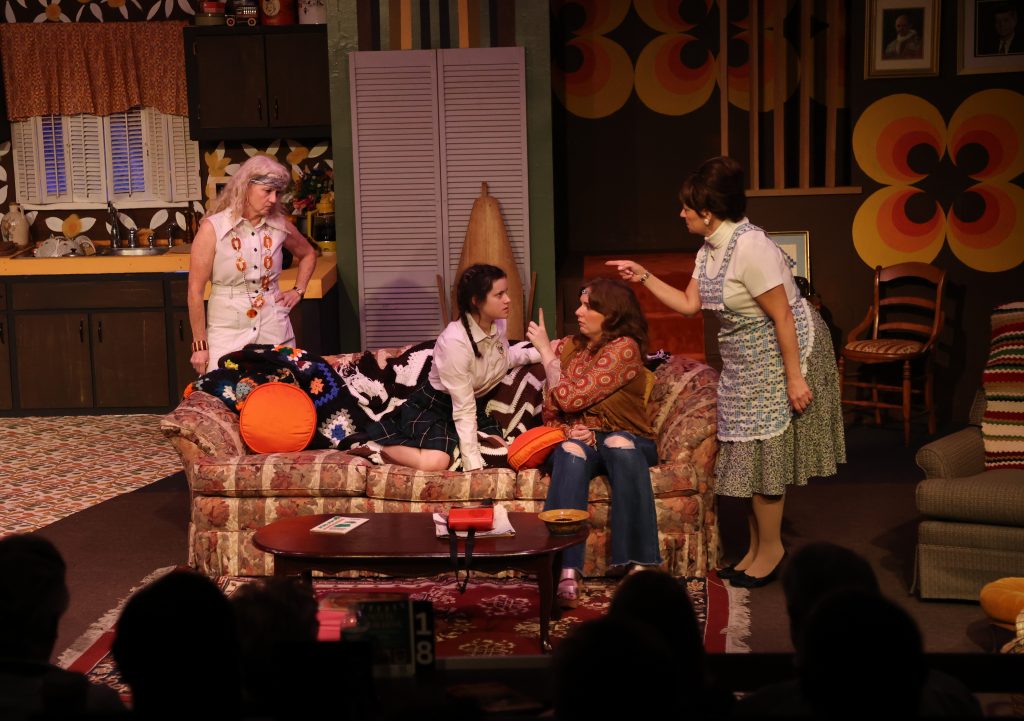On the last night of “The Incident at Our Lady of Perpetual Help,” the Cider Mill Stage successfully brought a community together while striving for feminism. Bringing the audience back in time, Rob Egan, director of the play and artistic director of Cider Mill Stage, shared a girl’s worst day in a funny and relatable way.
Breaking the fourth wall many times, “The Incident at Our Lady of Perpetual Help” tells the story of Linda, a senior in high school, remembering the worst day of her entire life while she prepares for college. Linda is introduced immediately to the audience as the narrator, making it clear that this is her memory, her view of what happened, and since it has been a long time, not all of it will be reliable.
She introduces us to her Irish-Catholic family, including her mother Josephine, who is very religious and hardworking. Josephine does everything for the family, including taking care of her mother-in-law, known as Grandma O’Shea, who is unable to walk due to a fracture on her hip, as she claims. Linda’s younger sister, Becky, has an old mystery movie obsession and dresses like a detective with a trench coat and fedora, secretly playing with her recorder. Her father, Mike, isn’t around as much, but plays that traditional “I rule this house since I pay for it” role.
Then there is her aunt, Terry, who is difficult not to fall in love with. Going against all odds of the 70s, Terry is a “modern woman,” fighting for feminism and equal rights in her marriage. She has no kids and is always holding a cigarette, defending her sister against Grandma O’Shea. With incredible courage, Terry is Linda’s role model and best friend.
The first domino, as Linda calls it, is when her mother asks her to explain to her younger sister the wonderful process a woman has to go through — menstruation. Josephine cries about how it’s a beautiful rite of passage, and how she would hate to scare her daughter. Since she didn’t have much of an option, Linda agrees. However, her mother, taking advantage of the situation, says that she should explain everything for it to make sense, including the birds and the bees, where babies come from and how to deal with all of it.
Stuck with the responsibility to teach her sister about menstruation and sex, Linda tries to explain it to her sister in a scientific way. However, halfway through, she starts getting heated up.
She explains it was because she didn’t have the best relationship with men and sex at that moment. Her boyfriend wasn’t responding to her letters, a scary concept as she was convinced she was pregnant and ought to be married soon.
The play acknowledges important topics from today in very memorable and heartwarming ways. It takes on motherhood, feminism, how important education is and even toxic masculinity by allowing the audience to laugh and relate.
Egan, explained why he chose this play and what he wishes for his audience.
“This play talks about reproductive health and what women could be,” Egan said. “It wasn’t until 1974 that women could have credit cards, so I thought it was really relevant to choose a piece that mentioned these topics we discuss today. I hope the audience leaves smiling, finds something in this play to relate to and, in an era of streaming, connect to and live this experience that is theatre.”
Aside from just connecting with the audience, the cast playing a family of so many empowered women roles felt like a breath of fresh air for Kylee Ann Thetga, actress playing Linda O’Shea and administrative assistant.
Thetga described how this role has connected her to her family and how she views the script.
“Internally it has really connected me to my family,” Thetga said. “I’m playing an Irish-Catholic 19-year-old in 1973 and my grandmother was a 19-year-old in 1973. The connection is so palpable between me, my family and my roots.”
Thetga went on to describe the influence of the play.
“This show is very empowering for all women in the audience,” Thetga said. “It’s a woman’s memory and all of the most important characters who help and uplift her are also women.”
Danny Ceballos ’85, drove the audience to non-stop laughter by playing the three completely different roles of Linda’s absent father, the judgemental but not completely morally correct Priest Father Lovett and the gossip lady of the town, Betty Heckenbach.
Ceballos came back after 30 years to the Cider Mill Stage and discussed his excitement about what’s coming next.
“As the only cisgender male in the play, my three characters represent the nemesis for women,” Ceballos said. “It was important for me that people wouldn’t laugh at the character but with the characters, to relate. I’m excited for the next productions. This is community theatre in the truest sense of the word.”
With the most respectable and loving cast, “The Incident at Our Lady of Perpetual Help” closed with a great last night show — a play about family and how we can be so far removed from a point in time, but still discuss the same topics. The Cider Mill Stage creates a sense of community with a play that involves the audience in a familial, heartwarming and relevant way.



